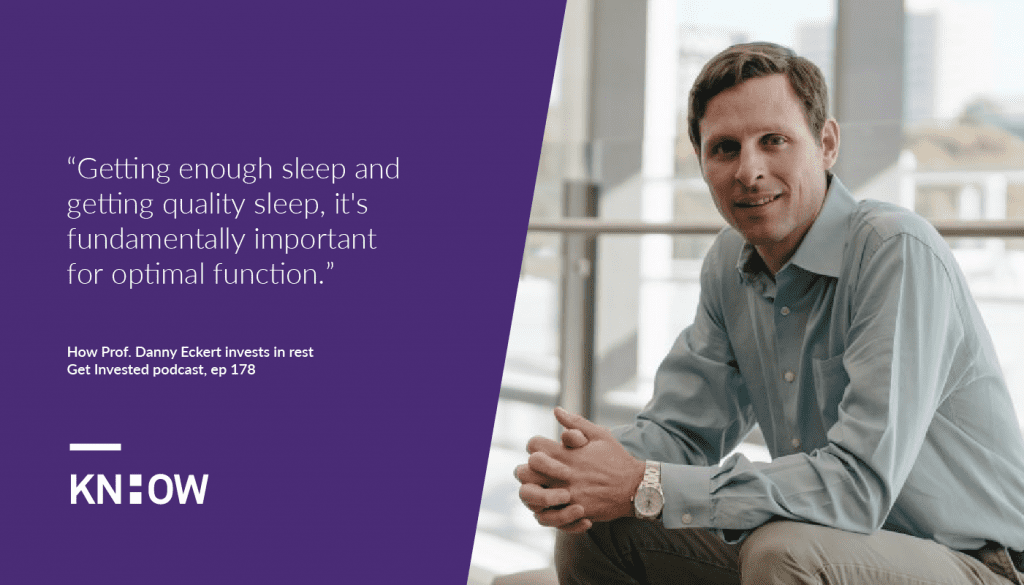People with a structured sleeping routine will reap high performance and wellbeing benefits, says one of the world’s leading sleep experts.
It’s common knowledge that a good night’s sleep can improve your day, but it is also the key to reaching your full potential, both as an investor creating wealth and in every day life.
KnowHow founder Bushy Martin was joined by world leading sleep expert Professor Danny Eckert on the Get Invested podcast.
Danny has been actively involved in human sleep and respiratory physiology research for over two decades. He is a National Health and Medical Research Council of Australia Senior Research Fellow and Mathew Flinders Professor at Flinders University in South Australia.
Danny talked about the benefits of investing in rest with the impact of sleep being so widespread, including body organs, emotions, performance and decision-making.
“Getting enough sleep and getting quality sleep, it’s fundamentally important to optimal function,” Danny said.
“Every organ and every cell in the body is potentially adversely affected [by poor sleep], so it’s a profound effect on the human body and our function.
“[For example], if you stay awake for 19 hours in a row, you’re performing at a blood alcohol concentration equivalent of .05. So, you’re legally intoxicated after being awake for more than 19 hours.”
Danny explained that sleep can heavily impact upon a person’s emotions in the short-term and mental health in the long-term. This can be particularly detrimental to investors, especially during volatile times where events like COVID-19 can drive rushed, emotional decisions based on fear or greed.
“A night of sleep deprivation immediately the next day can affect our mood, our attitude, our ability. This area in the brain called the amygdala, that is part of the limbic system which controls our emotional response, and it’s so much more reactive and we’re much more likely to make rash decisions when there’s lots of sleep deprivation,” he said.
“Sleep disruption and insomnia is one of the criteria for mental health issues and depression. So if you are sleeping poorly or if you’ve got sleep apnoea, then depression is much more common … But on the upside of that, there’s obviously also a potential to intervene by prioritising sleep and getting enough time for it.”
But what are the best sleeping practices to adopt? Danny said it is firstly about having the right sleeping environment.
“If we think about what we call sleep hygiene, you are sleeping in a place where you’ve got a comfortable bed and sleeping environment. So, there are good temperatures (20 to 24 degrees celsius is optimal), it’s dark, it’s quiet and you’ve got the devices out of there,” Danny said.
Consistency in sleeping patterns and routines is also key.
“On an ongoing basis, it’s also about getting to sleep at roughly the same time. It seems the data suggests that actually waking up at the same time every day is more associated with optimal performance and wellbeing. So having that routine is key, and then waking up basically wanting to jump out of bed alert and ready to go because you’ve had enough sleep. Your body will thank you for it.”
But with more people living busy and stressful lives, it can be hard to achieve the recommended 7 – 9 hours sleep as an adult. Fortunately, Danny also discussed the benefits of the ‘power nap’. Although, he said these shouldn’t be a common occurrence.
“[Naps] create a great little rejuvenator and they do increase your alertness and performance. 10 to 20 minutes is probably optimal for the daytime, not any more than that because you start to get what’s called sleep inertia, where you just feel groggy and you feel worse than you started off with … but that 10 minute power nap is all you need to get going again,” he said.
“If you start having these naps on a regular basis during the day, then it can start to affect your sleep patterns at night and you can create problems at night. So it’s not recommended unless you need a circuit breaker, whether it be shift work or you haven’t had enough sleep for whatever reason the night before.”
He also recommended using meditation practices to relax the brain and overcome any issues with falling asleep.
“Mindfulness, meditation, those kind of practices, particularly if people are having issues getting off to sleep or staying asleep, they can help hugely in terms of quarantining the brain there,” he said.
“Yes, sleep is a physiological biological process, but it’s also a behavioural one. And so if we’ve had a busy day or have lots going on in our mind, we’ve got to turn that off so that we can let the physiology do its thing because otherwise our brain can override these natural sleep processes. So meditation can be great in that lead up to sleep and winding down.
“Meditation in the morning for other reasons could be a great way to map out the day and get you focussed and ready for the day ahead. Fundamentally, it also does result in plasticity of the brain, new connections, better thinking, more creativity and all these sort of things.”
Listen to the full interview here.
Want to Know How you can build wealth with the help of leading, qualified experts? Talk to the team at KnowHow, now.




